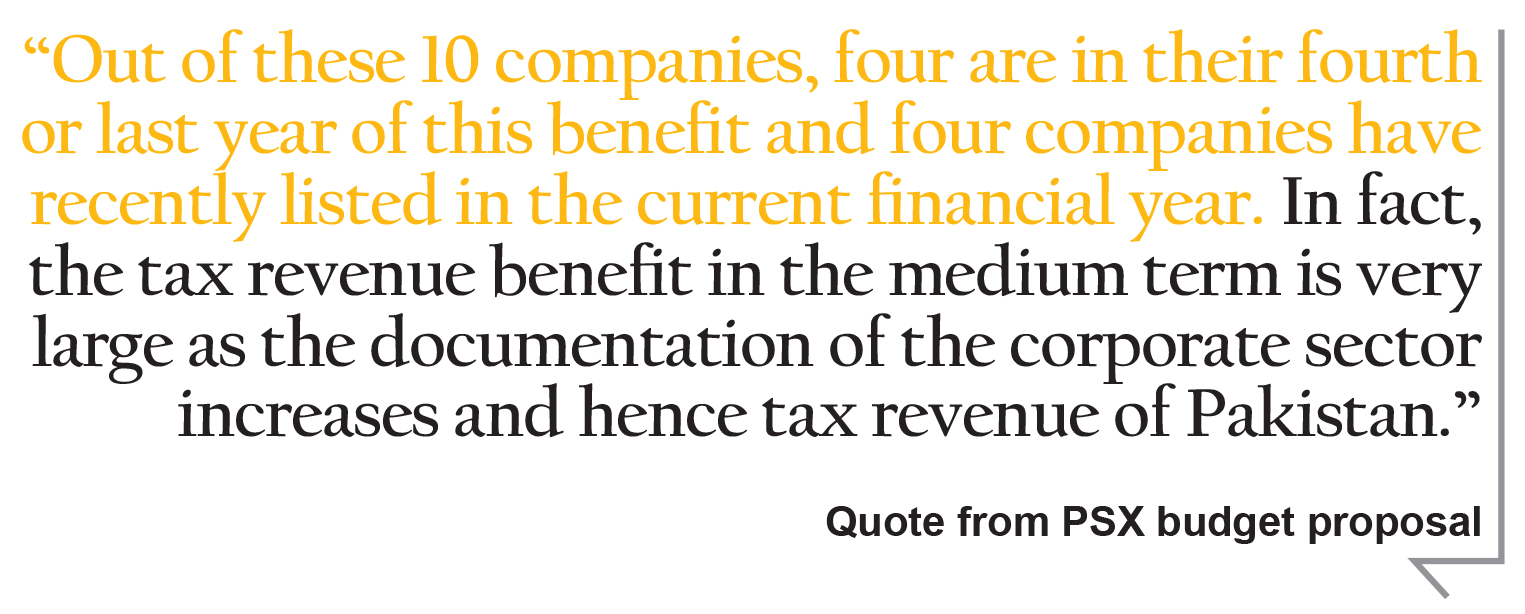In the past we’ve talked about what IPOs are, why companies go for them, and how one can invest. While there are a number of reasons why a business would consider going public, you would assume tax concessions to be least on the priority list. In fact, given that an IPO means a company is doing well and gaining investment, they should logically be up for more taxation. Right?
Wrong, because earlier last week, the managing director of the Pakistan Stock Exchange, Farrukh H Khan, said that the PSX is in consultation with the Ministry of Finance and the Federal Board of Revenue to restore tax credit for companies opting for IPOs. “We look forward to constructively resolving this issue with the support of the Ministry of Finance and FBR for the benefit of investors, companies, and Pakistan’s economy,” he tweeted.
To understand why this is a bad idea and where it is coming from, Profit brings you a brief reminder of what IPOs are, and why giving tax breaks to companies going for them is possibly not the best idea in the world.
What is an IPO again?
This is simply a refresher – feel free to skip it. As the name suggests and one might intuitively guess, an IPO is when a private company decides to go public and offers people the opportunity to buy shares or stocks in it. Essentially, an IPO happens when a company is looking to gain capital and turns to the general public for it rather than getting a loan from a bank and increasing their debt. It usually means that a company is looking to expand and expand at a certain rate.
An IPO is the first time a company is able to sell securities to the public. IPOs are called Primary Markets. Their purpose is to bridge companies that need funds with investors.
The tax credit explained
Just a little recap, in the past, the government gave companies tax credit for four years when they would go for listing at the PSX. This also included a 20% tax credit on taxable income for the first two years after listing, and then declining to 10% in the next two years. Right before Budget 2021, in March the government took back this incentive. Tax credit on listings under Section 65C has been withdrawn through Second Amendment Act, 2021.

Following the budget, Khan has asked the government on more than one occasion to reconsider its stance on the tax credit. As per Khan, the tax credit alone was resulting in a loss of Rs 100- 150 million. However, he went on to say, “On the other hand, it led to higher collection of revenue through capital gains tax (CGT) on trading in shares of the same companies at the Pakistan Stock Exchange.” He reminded all those present. It is true that CGT is a big source of revenue. As per the National Clearing Company of Pakistan Limited, CGT brought in Rs 8.8 billion during FY21.
In its budget proposal for the year, the PSX claimed that an increased number of listed companies and higher profitability (due to effective corporate governance, better disclosures and availability to raise capital from the market) lead to higher tax revenue for the government, including incremental revenues from CGT. Hence, the exchange believes it is important to get companies to list.
In its budget proposal the exchange stated that only 10 listed companies were availing the tax credit. Their financials, however, showed that they have a tax revenue impact of Rs 175 million per annum.
“Out of these 10 companies, four are in their fourth or last year of this benefit and four companies have recently listed in the current financial year. In fact, the tax revenue benefit in the medium term is very large as the documentation of the corporate sector increases and hence tax revenue of Pakistan. Further, the CGT collected on these 10 symbols for the eight-month period from July 2020 to February 2021 is Rs176m and, extrapolating based on this average collection of CGT, the tax collection for the 12-month period could be Rs264m compared with the total estimated tax credits of Rs175m availed by these 10 companies,” said the proposal.
Why this doesn’t make sense
It’s simple. This is a form of tax arbitrage. Companies that are listing for arbitrage aren’t the companies you want on the exchange. In your effort to bring in more companies to list, you’re actually calling in all the wrong ones. Instead, the PSX needs to sit down and think beyond shortcuts that get the numbers. You could celebrate a record number of listings through this incentive next year, but the question will be, did the PSX do its job of helping only the big businesses that don’t need capital to get listed?

Essentially, companies that are listing for the sole purpose of getting tax credit aren’t really going to go public with a large enough free float. These are also the companies that aren’t listing to raise capital, make private equity exits, or add more authenticity and credibility to their name.
It is also important to note that if a company is listing for the sole purpose of reaping the gains of tax credit, are they really the safest place to invest? While the PSX is a risky place, and IPOs are risky too, companies that rely on tax credits don’t really have the competitiveness or financial integrity to actually benefit the exchange or more importantly investors.
Moreover, if we look at the past, while this incentive has existed, Pakistan hasn’t really seen a spurt in listings due to it. Let’s illustrate that with numbers and a regional comparison. Pakistan has approximately 540 companies listed on the Pakistan Stock Exchange. Let’s compare the number of listings in South Asia. India has 5,034 companies listed on the Bombay Stock Exchange, 3500 on the Calcutta Stock Exchange, and 1300 on the National Stock Exchange of India located in Mumbai. Bangladesh has 750 listings on the Dhaka Stock Exchange, and 293 on the Chittagong Stock Exchange. Sri Lanka has 285 listed companies, Neal 230, Bhutan 20.
Just a small reminder, the PSX is a combination of the Islamabad Stock Exchange, Lahore Stock Exchange, and the Karachi Stock Exchange. The fact that the sole stock exchange in Pakistan has less listings than either of the three exchanges in India, or the Dhaka Stock Exchange is strong enough to show that tax credits haven’t really been as great of an incentive as they are being pushed as.
There are multiple other reasons to list your company. The PSX could incentivize more listings through an easier process of IPOs whereby smaller names also get listed. With a recent spurt in startups, the fact that IPOs lead to better and more transparent valuations could also help push up listings. Moreover, the most important reason to list is access to capital. With the policy rate now gradually hinting that it will rise over time, one could say that raising capital through IPOs may seem more attractive.
Moreover, the PSX needs to revise its business model and think of listing fees as a major form of revenue and set big targets for itself that are not dependent on concessions. The PSX should be a symbol of competitiveness and financial strength, not an institution that gives candy to lure in babies.
Profit has asked the following questions from the PSX on 14 October 2021, but has received no response. 1. Doesn’t the PSX think that this would incentivize listing for tax benefits? 2. Would a company that lists for this purpose rather than raising public funds care about minority shareholder rights? 3. Do you think this will push for tax arbitrage? 4. What is the listing fee for a company? 5. With a current IPO spurt without such concessions, does the PSX really think the decision to fall to the whim of corporations as feasible?

























